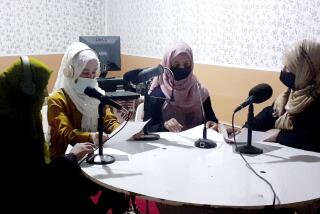The Keys to an Afghan Past That the Taliban Overlooked
- Share via
QASABA, Afghanistan — In a shabby fourth-floor walk-up in this suburb north of Kabul, beyond a scruffy market filled with wilted produce and scampering kids, stands a thing of beauty that time and Afghans have forgotten.
The black-lacquered piano has languished in silence in an engineer’s barren living room since the day the music died, Sept. 26, 1996, when Taliban fundamentalists took power and deemed song and music offenses to God.
Despite the more enlightened era that dawned when the Taliban was driven out last month, there seems no one left in Afghanistan who knows how to play.
“We might as well sell it to a carpenter. Maybe someone could make use of the wood,” says Ghulam Mohammed, a member of the extended family living in the sparse three-room flat that was once alive with nightly recitals by a cousin’s Russian wife, who has since returned to her homeland.
Mohammed’s brother-in-law Shirinel bought the piano from his cousin for less than $100, even though he couldn’t play a single note on the Ukraina upright. Nostalgic for the nightly serenades and hopeful that his young sons might one day learn to play, the furloughed public works engineer hid his investment whenever the Taliban staged its destructive raids.
“We put some boards in front and a cloth over the whole thing and convinced them it was a cupboard,” says the piano’s owner, intimating that the Taliban enforcers were too ignorant to know what they wanted to destroy.
Although the piano is partially hidden when the living room door is opened, the room’s only other furnishings are the floor cushions and rug of the traditional Afghan salon--a stark contrast to the instrument.
With the fundamentalists now chased into hiding, the ivory keys could safely be coaxed into music-making. But the Taliban’s systematic extinguishing of culture broke spirits as well as keys, chords, strings, bows and trumpets. Unable to indulge their passions and talents, those who might teach a new generation of Afghans their scales have fled abroad.
Taliban Takeover Led to a Musical Brain Drain
Virtually every foreign musician left Afghanistan during the last decade, and most prominent national artists have died or emigrated, says Ustad Golam Nabi, head of the defunct cultural programming section of Radio Afghanistan.
“After the Taliban came, artists feared there was no hope for them, so they left, and those who went to Europe have found new lives for themselves now,” Nabi says. “Of those who stayed, most are dead now. Musicians are too sensitive to survive what happened here in recent years.”
The radio studio warehouses a grand piano, but it has suffered a worse fate than the badly out-of-tune upright in Shirinel’s parlor. Tipped on its side and squirreled behind other instruments and boxes stored in a dank basement, the piano is a sad sight: Its legs have broken off, and its delicate chords have been damaged by the boards and beams placed under its cover to hide them.
“There is no one left to play it anyway,” says Nabi, naming three once-renowned Afghan artists who performed for radio broadcasts before the succession of wars in the 1990s wore away this society’s thin artistic stratum.
Pianos were always rare and precious instruments in Afghanistan, where Eastern music dominates and the works of Beethoven, Brahms and Tchaikovsky have carried an undertone of Western intrusion along with their enchanting notes.
But the cultural champions insist that times have changed and interest in foreign classical music will one day burgeon.
Afghanistan’s new interim leadership consists of 30 Cabinet members, but none is directly responsible for culture, an oversight or low priority that dismays those pained by this country’s staggering losses in art, music and theater during the Taliban era.
But as hopes rise that the current steps toward peace and stability will strengthen, a few ardent advocates have come forward to urge Afghans to reacquaint themselves with music as part of the emotional healing process.
Rafiq Khushnood, once a popular vocalist and practitioner of Eastern string instruments, returned from his wartime refuge in Pakistan as soon as the Taliban withdrew Nov. 13 from Kabul, the Afghan capital, under bombardment from U.S. and British forces.
Efforts to Reestablish a Western Music School
A teacher of classical music among Afghan refugees in the Pakistani city of Peshawar for the last six years, he has been lobbying former colleagues at the radio culture department to help reestablish a Western music school now that Kabul has been liberated.
Khushnood has urged his friend Shirinel to hold on to his piano for a few more months in hopes that he can buy it for his future students to use.
“It was hardly more than a decade ago that we had a faculty of art at the university and a theater in the city. We had students who went off to Moscow to study at the conservatory or the Bolshoi Ballet,” he recalls wistfully. “Now we are starting with nothing, but it must start.”
The long climb back from the cultural Stone Age imposed by the Taliban has begun, if modestly. An ensemble of Afghan musicians recorded a national music special for television on the recent occasion of Eid al-Fitr, the Muslim holiday celebrating the end of the Ramadan fasting month. The performance came from the heart, because none of the broadcast employees have been paid since the Taliban banned TV and limited radio to prayers and official pronouncements.
Despite the lack of practice and the dearth of instruments, Afghanistan’s surviving artists will once again find their voices, chords and notes, Khushnood says.
“It’s like literacy,” he says. “Once you learn to read or play music, you never forget.”
More to Read
The biggest entertainment stories
Get our big stories about Hollywood, film, television, music, arts, culture and more right in your inbox as soon as they publish.
You may occasionally receive promotional content from the Los Angeles Times.











